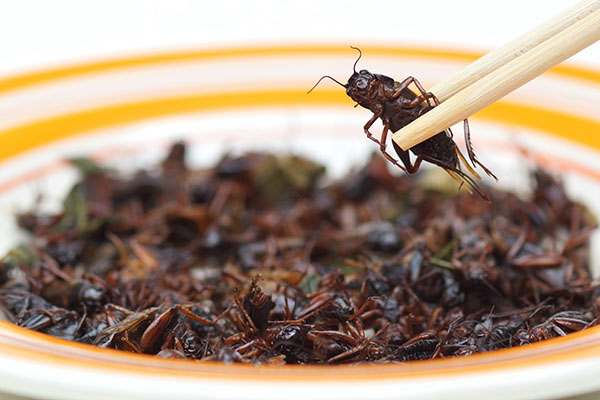University of Delaware offers course on eating and cooking insects
04/17/2025 / By Ramon Tomey

- The University of Delaware (UDel) offers a course called “Insects as Food,” taught by entomology professor Michael Crossley, where students learn to cook and eat insects like sago worm chili and black ant lemon scones.
- The course highlights that many cultures already eat insects and promotes entomophagy, with dishes described as surprisingly tasty (e.g., black ants for a citrus-like flavor).
- The UDel course appears to be part of a broader push by entities like the World Economic Forum (WEF) to normalize insect consumption as a sustainable protein source amid claims of food scarcity.
- The WEF and companies like Ynsect argue that insect farming is more efficient (e.g., mealworms require 12x less feed than cattle) and environmentally friendly, with AI-driven vertical farms producing large-scale insect products.
- Despite safety approvals (like the EU’s 2021 mealworm clearance), resistance remains, with critics dismissing it as forced dietary change by elites rather than genuine necessity.
The University of Delaware (UDel) is now offering a course on eating and cooking insects, a prelude to a future where the globalist elites will make people “eat ze bugs.”
WPVI 6 reported on the new course at UDel titled “Insects as Food”. The course taught by professor Michael Crossley of the university’s Department of Entomology and Wildlife Ecology teaches students how to incorporate bugs into their diets as a sustainable protein source.
Students enrolled in the course won’t just be listening to lectures – they’ll get to whip up a storm in the university’s test kitchen at Worrilow Hall. Sago worm chili, spicy giant water bug pasta salad and black ant lemon scones are just some of the culinary creations students make using creepy crawlies.
According to Crossley, an advocate for entomophagy (the practice of eating insects), many cultures already embrace bugs as a dietary staple. “Black ants produce formic acid, which has a zesty flavor to it, so it’s almost like putting in lemon rind,” he said of the main ingredient for his scones. WPVI 6 mentioned that students in Crossley’s course describe the dishes as surprisingly palatable.
The globalist diet you didn’t sign up for
But looking at it deeper, the UDel course appears to be a ploy to normalize the consumption of insects. According to globalist propaganda, the combination of dwindling arable land and ballooning population justifies the need to make people eat insects for protein.
In particular, the globalist World Economic Forum (WEF) has championed insect farming as a solution to this food supply problem. In July 2021, the WEF published on its website a piece by Antoine Hubert, president and CEO of edible bug company Ynsect, that expounds on this argument.
Hubert argued, citing studies, that mealworms need 12 times less feed than cattle to produce the same amount of protein. Beyond protein, insect farming offers benefits like natural fertilizer and reduced methane emissions – up to 80 times lower than beef production. The Ynsect CEO also mentioned that his company is already industrializing insect agriculture, using vertical farms driven by artificial intelligence to produce 100,000 tonnes of insect products annually.
Hubert mentioned that the European Food Safety Authority deemed mealworms safe for human consumption in 2021. He nevertheless admitted that cultural resistance remains a hurdle. (Related: EAT BUGS AND BE HAPPY: EU authorities approve crickets, mealworms in food.)
Crossley’s course aims to normalize the practice, one crunchy bite at a time. Whether or not diners are ready to swap steak for sago worms, the conversation about insects as food is no longer just a niche curiosity – it’s a growing necessity. But at the end of the day, no sensible person would swap beef for bugs just because the WEF and other globalists say so.
Visit FoodCollapse.com for more similar stories.
Watch Jefferey Jaxen and Del Bigtree talking about the globalist push to make people eat bugs in this clip.
This video is from the alltheworldsastage channel on Brighteon.com.
More related stories:
WaPo tells poor Americans to EAT BUGS this Christmas.
You will eat ze bugs! Switzerland brainwashing kids to eat INSECTS.
You WILL eat the bugs: Major brands quietly slipping insects into your food.
Sources include:
Submit a correction >>
Tagged Under:
campus insanity, college course, eat the bugs, education system, entomophagy, food freedom, food supply, globalism, globalist elites, insect consumption, insect farming, insect protein, world economic forum
This article may contain statements that reflect the opinion of the author
RECENT NEWS & ARTICLES
COPYRIGHT © 2018 INDOCTRINATION.NEWS
All content posted on this site is protected under Free Speech. Indoctrination.news is not responsible for content written by contributing authors. The information on this site is provided for educational and entertainment purposes only. It is not intended as a substitute for professional advice of any kind. Indoctrination.news assumes no responsibility for the use or misuse of this material. All trademarks, registered trademarks and service marks mentioned on this site are the property of their respective owners.




















